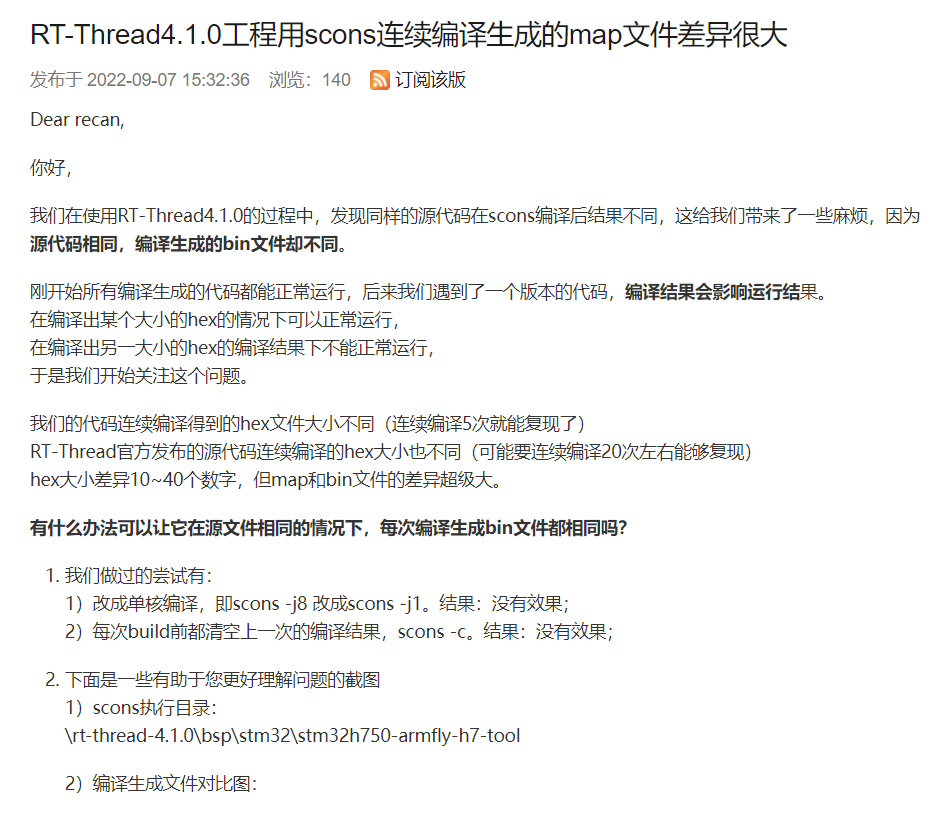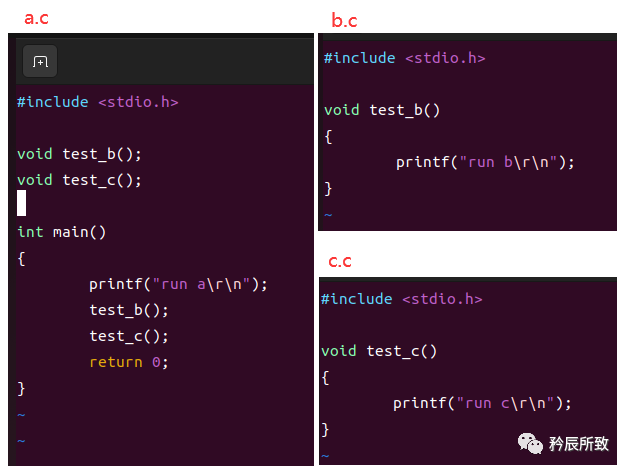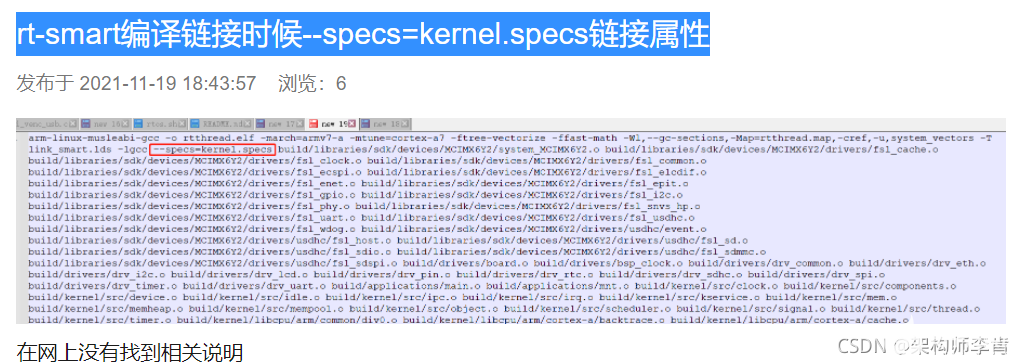1 问题来源
我们都知道在一般的嵌入式开发中,使用gcc编译固件的一般流程是,先把所有的.c文件和.s文件编译成.o文件,然后把所有的.o文件链接成一个elf文件,最后由elf文件导出bin文件。 那么在链接成elf文件这一步中,我们需要使用到一个叫链接脚本的文件,这个文件主要描述了程序的ROM分布和RAM分布,它也直接决定了二进制文件的内容结构。 那么问题来了,当我们手上没有可用的链接脚本的时,我们如果获取到默认的链接脚本呢?
2 解决方案
2.1 测试平台
Ubuntu20.04 X64环境 gcc version9.3.0(Ubuntu9.3.0-17ubuntu1~20.04)
2.2 示例代码
一段很简单的hello world代码:
#include
int main(int argc, const char *argv[])
{
printf("hello world ...\r\n");
return 0;
}
我们直接使用gcc,不用任何参数就可以编译可执行文件:
test_gcc$ gcc test.c
test_gcc$
test_gcc$ ls
a.out pass_array2_test.c test.c
test_gcc$
test_gcc$ ./a.out
hello world ...
但是我并没有看到任何链接脚本啊? 因为那是gcc使用了默认的链接脚本。
2.3 分析gcc的默认参数
gcc有个-v选项可以看到看似简单的gcc test.c都发生了啥:
test_gcc$ gcc test.c -v
Using built-in specs.
COLLECT_GCC=gcc
COLLECT_LTO_WRAPPER=/usr/lib/gcc/x86_64-linux-gnu/9/lto-wrapper
OFFLOAD_TARGET_NAMES=nvptx-none:hsa
OFFLOAD_TARGET_DEFAULT=1
Target: x86_64-linux-gnu
Configured with: ../src/configure -v --with-pkgversion='Ubuntu 9.3.0-17ubuntu1~20.04' --with-bugurl=file:///usr/share/doc/gcc-9/README.Bugs --enable-languages=c,ada,c++,go,brig,d,fortran,objc,obj-c++,gm2 --prefix=/usr --with-gcc-major-version-only --program-suffix=-9 --program-prefix=x86_64-linux-gnu- --enable-shared --enable-linker-build-id --libexecdir=/usr/lib --without-included-gettext --enable-threads=posix --libdir=/usr/lib --enable-nls --enable-clocale=gnu --enable-libstdcxx-debug --enable-libstdcxx-time=yes --with-default-libstdcxx-abi=new --enable-gnu-unique-object --disable-vtable-verify --enable-plugin --enable-default-pie --with-system-zlib --with-target-system-zlib=auto --enable-objc-gc=auto --enable-multiarch --disable-werror --with-arch-32=i686 --with-abi=m64 --with-multilib-list=m32,m64,mx32 --enable-multilib --with-tune=generic --enable-offload-targets=nvptx-none=/build/gcc-9-HskZEa/gcc-9-9.3.0/debian/tmp-nvptx/usr,hsa --without-cuda-driver --enable-checking=release --build=x86_64-linux-gnu --host=x86_64-linux-gnu --target=x86_64-linux-gnu
Thread model: posix
gcc version 9.3.0 (Ubuntu 9.3.0-17ubuntu1~20.04)
COLLECT_GCC_OPTIONS='-v' '-mtune=generic' '-march=x86-64'
/usr/lib/gcc/x86_64-linux-gnu/9/cc1 -quiet -v -imultiarch x86_64-linux-gnu test.c -quiet -dumpbase test.c -mtune=generic -march=x86-64 -auxbase test -version -fasynchronous-unwind-tables -fstack-protector-strong -Wformat -Wformat-security -fstack-clash-protection -fcf-protection -o /tmp/ccvW5Igg.s
GNU C17 (Ubuntu 9.3.0-17ubuntu1~20.04) version 9.3.0 (x86_64-linux-gnu)
compiled by GNU C version 9.3.0, GMP version 6.2.0, MPFR version 4.0.2, MPC version 1.1.0, isl version isl-0.22.1-GMP
GGC heuristics: --param ggc-min-expand=100 --param ggc-min-heapsize=131072
ignoring nonexistent directory "/usr/local/include/x86_64-linux-gnu"
ignoring nonexistent directory "/usr/lib/gcc/x86_64-linux-gnu/9/include-fixed"
ignoring nonexistent directory "/usr/lib/gcc/x86_64-linux-gnu/9/../../../../x86_64-linux-gnu/include"
#include "..." search starts here:
#include <...> search starts here:
/usr/lib/gcc/x86_64-linux-gnu/9/include
/usr/local/include
/usr/include/x86_64-linux-gnu
/usr/include
End of search list.
GNU C17 (Ubuntu 9.3.0-17ubuntu1~20.04) version 9.3.0 (x86_64-linux-gnu)
compiled by GNU C version 9.3.0, GMP version 6.2.0, MPFR version 4.0.2, MPC version 1.1.0, isl version isl-0.22.1-GMP
GGC heuristics: --param ggc-min-expand=100 --param ggc-min-heapsize=131072
Compiler executable checksum: bbf13931d8de1abe14040c9909cb6969
COLLECT_GCC_OPTIONS='-v' '-mtune=generic' '-march=x86-64'
as -v --64 -o /tmp/cc17VwSh.o /tmp/ccvW5Igg.s
GNU assembler version 2.34 (x86_64-linux-gnu) using BFD version (GNU Binutils for Ubuntu) 2.34
COMPILER_PATH=/usr/lib/gcc/x86_64-linux-gnu/9/:/usr/lib/gcc/x86_64-linux-gnu/9/:/usr/lib/gcc/x86_64-linux-gnu/:/usr/lib/gcc/x86_64-linux-gnu/9/:/usr/lib/gcc/x86_64-linux-gnu/
LIBRARY_PATH=/usr/lib/gcc/x86_64-linux-gnu/9/:/usr/lib/gcc/x86_64-linux-gnu/9/../../../x86_64-linux-gnu/:/usr/lib/gcc/x86_64-linux-gnu/9/../../../../lib/:/lib/x86_64-linux-gnu/:/lib/../lib/:/usr/lib/x86_64-linux-gnu/:/usr/lib/../lib/:/usr/lib/gcc/x86_64-linux-gnu/9/../../../:/lib/:/usr/lib/
COLLECT_GCC_OPTIONS='-v' '-mtune=generic' '-march=x86-64'
/usr/lib/gcc/x86_64-linux-gnu/9/collect2 -plugin /usr/lib/gcc/x86_64-linux-gnu/9/liblto_plugin.so -plugin-opt=/usr/lib/gcc/x86_64-linux-gnu/9/lto-wrapper -plugin-opt=-fresolution=/tmp/ccPxjLXh.res -plugin-opt=-pass-through=-lgcc -plugin-opt=-pass-through=-lgcc_s -plugin-opt=-pass-through=-lc -plugin-opt=-pass-through=-lgcc -plugin-opt=-pass-through=-lgcc_s --build-id --eh-frame-hdr -m elf_x86_64 --hash-style=gnu --as-needed -dynamic-linker /lib64/ld-linux-x86-64.so.2 -pie -z now -z relro /usr/lib/gcc/x86_64-linux-gnu/9/../../../x86_64-linux-gnu/Scrt1.o /usr/lib/gcc/x86_64-linux-gnu/9/../../../x86_64-linux-gnu/crti.o /usr/lib/gcc/x86_64-linux-gnu/9/crtbeginS.o -L/usr/lib/gcc/x86_64-linux-gnu/9 -L/usr/lib/gcc/x86_64-linux-gnu/9/../../../x86_64-linux-gnu -L/usr/lib/gcc/x86_64-linux-gnu/9/../../../../lib -L/lib/x86_64-linux-gnu -L/lib/../lib -L/usr/lib/x86_64-linux-gnu -L/usr/lib/../lib -L/usr/lib/gcc/x86_64-linux-gnu/9/../../.. /tmp/cc17VwSh.o -lgcc --push-state --as-needed -lgcc_s --pop-state -lc -lgcc --push-state --as-needed -lgcc_s --pop-state /usr/lib/gcc/x86_64-linux-gnu/9/crtendS.o /usr/lib/gcc/x86_64-linux-gnu/9/../../../x86_64-linux-gnu/crtn.o
COLLECT_GCC_OPTIONS='-v' '-mtune=generic' '-march=x86-64'
我们抓住核心,主要有三步: 第一步是使用/usr/lib/gcc/x86_64-linux-gnu/9/cc1编译.c文件,生成/tmp/ccvW5Igg.s; 第二步是使用as编译.s文件,生成/tmp/cc17VwSh.o; 第三步是使用/usr/lib/gcc/x86_64-linux-gnu/9/collect2链接.o文件,生成a.out。 从第三步我们可以看出,最终生成elf文件(a.out)是collect2,它其实也是ld命令最终调用的命令。
2.4 导出默认链接脚本的方法
2.4.1 使用ld命令导出
ld --verbose
这样就可以得到输出:
test_gcc$ ld --verbose
GNU ld (GNU Binutils for Ubuntu) 2.34
Supported emulations:
elf_x86_64
elf32_x86_64
elf_i386
elf_iamcu
elf_l1om
elf_k1om
i386pep
i386pe
using internal linker script:
==================================================
/* Script for -z combreloc -z separate-code */
/* Copyright (C) 2014-2020 Free Software Foundation, Inc.
Copying and distribution of this script, with or without modification,
are permitted in any medium without royalty provided the copyright
notice and this notice are preserved. */
OUTPUT_FORMAT("elf64-x86-64", "elf64-x86-64",
"elf64-x86-64")
OUTPUT_ARCH(i386:x86-64)
ENTRY(_start)
SEARCH_DIR("=/usr/local/lib/x86_64-linux-gnu"); SEARCH_DIR("=/lib/x86_64-linux-gnu"); SEARCH_DIR("=/usr/lib/x86_64-linux-gnu"); SEARCH_DIR("=/usr/lib/x86_64-linux-gnu64"); SEARCH_DIR("=/usr/local/lib64"); SEARCH_DIR("=/lib64"); SEARCH_DIR("=/usr/lib64"); SEARCH_DIR("=/usr/local/lib"); SEARCH_DIR("=/lib"); SEARCH_DIR("=/usr/lib"); SEARCH_DIR("=/usr/x86_64-linux-gnu/lib64"); SEARCH_DIR("=/usr/x86_64-linux-gnu/lib");
SECTIONS
{
PROVIDE (__executable_start = SEGMENT_START("text-segment", 0x400000)); . = SEGMENT_START("text-segment", 0x400000) + SIZEOF_HEADERS;
.interp : { *(.interp) }
.note.gnu.build-id : { *(.note.gnu.build-id) }
.hash : { *(.hash) }
.gnu.hash : { *(.gnu.hash) }
.dynsym : { *(.dynsym) }
.dynstr : { *(.dynstr) }
.gnu.version : { *(.gnu.version) }
.gnu.version_d : { *(.gnu.version_d) }
.gnu.version_r : { *(.gnu.version_r) }
.rela.dyn :
{
*(.rela.init)
*(.rela.text .rela.text.* .rela.gnu.linkonce.t.*)
*(.rela.fini)
*(.rela.rodata .rela.rodata.* .rela.gnu.linkonce.r.*)
*(.rela.data .rela.data.* .rela.gnu.linkonce.d.*)
*(.rela.tdata .rela.tdata.* .rela.gnu.linkonce.td.*)
*(.rela.tbss .rela.tbss.* .rela.gnu.linkonce.tb.*)
*(.rela.ctors)
*(.rela.dtors)
*(.rela.got)
*(.rela.bss .rela.bss.* .rela.gnu.linkonce.b.*)
*(.rela.ldata .rela.ldata.* .rela.gnu.linkonce.l.*)
*(.rela.lbss .rela.lbss.* .rela.gnu.linkonce.lb.*)
*(.rela.lrodata .rela.lrodata.* .rela.gnu.linkonce.lr.*)
*(.rela.ifunc)
}
.rela.plt :
{
*(.rela.plt)
PROVIDE_HIDDEN (__rela_iplt_start = .);
*(.rela.iplt)
PROVIDE_HIDDEN (__rela_iplt_end = .);
}
. = ALIGN(CONSTANT (MAXPAGESIZE));
.init :
{
KEEP (*(SORT_NONE(.init)))
}
.plt : { *(.plt) *(.iplt) }
.plt.got : { *(.plt.got) }
.plt.sec : { *(.plt.sec) }
.text :
{
*(.text.unlikely .text.*_unlikely .text.unlikely.*)
*(.text.exit .text.exit.*)
*(.text.startup .text.startup.*)
*(.text.hot .text.hot.*)
*(SORT(.text.sorted.*))
*(.text .stub .text.* .gnu.linkonce.t.*)
/* .gnu.warning sections are handled specially by elf.em. */
*(.gnu.warning)
}
.fini :
{
KEEP (*(SORT_NONE(.fini)))
}
PROVIDE (__etext = .);
PROVIDE (_etext = .);
PROVIDE (etext = .);
. = ALIGN(CONSTANT (MAXPAGESIZE));
/* Adjust the address for the rodata segment. We want to adjust up to
the same address within the page on the next page up. */
. = SEGMENT_START("rodata-segment", ALIGN(CONSTANT (MAXPAGESIZE)) + (. & (CONSTANT (MAXPAGESIZE) - 1)));
.rodata : { *(.rodata .rodata.* .gnu.linkonce.r.*) }
.rodata1 : { *(.rodata1) }
.eh_frame_hdr : { *(.eh_frame_hdr) *(.eh_frame_entry .eh_frame_entry.*) }
.eh_frame : ONLY_IF_RO { KEEP (*(.eh_frame)) *(.eh_frame.*) }
.gcc_except_table : ONLY_IF_RO { *(.gcc_except_table .gcc_except_table.*) }
.gnu_extab : ONLY_IF_RO { *(.gnu_extab*) }
/* These sections are generated by the Sun/Oracle C++ compiler. */
.exception_ranges : ONLY_IF_RO { *(.exception_ranges*) }
/* Adjust the address for the data segment. We want to adjust up to
the same address within the page on the next page up. */
. = DATA_SEGMENT_ALIGN (CONSTANT (MAXPAGESIZE), CONSTANT (COMMONPAGESIZE));
/* Exception handling */
.eh_frame : ONLY_IF_RW { KEEP (*(.eh_frame)) *(.eh_frame.*) }
.gnu_extab : ONLY_IF_RW { *(.gnu_extab) }
.gcc_except_table : ONLY_IF_RW { *(.gcc_except_table .gcc_except_table.*) }
.exception_ranges : ONLY_IF_RW { *(.exception_ranges*) }
/* Thread Local Storage sections */
.tdata :
{
PROVIDE_HIDDEN (__tdata_start = .);
*(.tdata .tdata.* .gnu.linkonce.td.*)
}
.tbss : { *(.tbss .tbss.* .gnu.linkonce.tb.*) *(.tcommon) }
.preinit_array :
{
PROVIDE_HIDDEN (__preinit_array_start = .);
KEEP (*(.preinit_array))
PROVIDE_HIDDEN (__preinit_array_end = .);
}
.init_array :
{
PROVIDE_HIDDEN (__init_array_start = .);
KEEP (*(SORT_BY_INIT_PRIORITY(.init_array.*) SORT_BY_INIT_PRIORITY(.ctors.*)))
KEEP (*(.init_array EXCLUDE_FILE (*crtbegin.o *crtbegin?.o *crtend.o *crtend?.o ) .ctors))
PROVIDE_HIDDEN (__init_array_end = .);
}
.fini_array :
{
PROVIDE_HIDDEN (__fini_array_start = .);
KEEP (*(SORT_BY_INIT_PRIORITY(.fini_array.*) SORT_BY_INIT_PRIORITY(.dtors.*)))
KEEP (*(.fini_array EXCLUDE_FILE (*crtbegin.o *crtbegin?.o *crtend.o *crtend?.o ) .dtors))
PROVIDE_HIDDEN (__fini_array_end = .);
}
.ctors :
{
/* gcc uses crtbegin.o to find the start of
the constructors, so we make sure it is
first. Because this is a wildcard, it
doesn't matter if the user does not
actually link against crtbegin.o; the
linker won't look for a file to match a
wildcard. The wildcard also means that it
doesn't matter which directory crtbegin.o
is in. */
KEEP (*crtbegin.o(.ctors))
KEEP (*crtbegin?.o(.ctors))
/* We don't want to include the .ctor section from
the crtend.o file until after the sorted ctors.
The .ctor section from the crtend file contains the
end of ctors marker and it must be last */
KEEP (*(EXCLUDE_FILE (*crtend.o *crtend?.o ) .ctors))
KEEP (*(SORT(.ctors.*)))
KEEP (*(.ctors))
}
.dtors :
{
KEEP (*crtbegin.o(.dtors))
KEEP (*crtbegin?.o(.dtors))
KEEP (*(EXCLUDE_FILE (*crtend.o *crtend?.o ) .dtors))
KEEP (*(SORT(.dtors.*)))
KEEP (*(.dtors))
}
.jcr : { KEEP (*(.jcr)) }
.data.rel.ro : { *(.data.rel.ro.local* .gnu.linkonce.d.rel.ro.local.*) *(.data.rel.ro .data.rel.ro.* .gnu.linkonce.d.rel.ro.*) }
.dynamic : { *(.dynamic) }
.got : { *(.got) *(.igot) }
. = DATA_SEGMENT_RELRO_END (SIZEOF (.got.plt) >= 24 ? 24 : 0, .);
.got.plt : { *(.got.plt) *(.igot.plt) }
.data :
{
*(.data .data.* .gnu.linkonce.d.*)
SORT(CONSTRUCTORS)
}
.data1 : { *(.data1) }
_edata = .; PROVIDE (edata = .);
. = .;
__bss_start = .;
.bss :
{
*(.dynbss)
*(.bss .bss.* .gnu.linkonce.b.*)
*(COMMON)
/* Align here to ensure that the .bss section occupies space up to
_end. Align after .bss to ensure correct alignment even if the
.bss section disappears because there are no input sections.
FIXME: Why do we need it? When there is no .bss section, we do not
pad the .data section. */
. = ALIGN(. != 0 ? 64 / 8 : 1);
}
.lbss :
{
*(.dynlbss)
*(.lbss .lbss.* .gnu.linkonce.lb.*)
*(LARGE_COMMON)
}
. = ALIGN(64 / 8);
. = SEGMENT_START("ldata-segment", .);
.lrodata ALIGN(CONSTANT (MAXPAGESIZE)) + (. & (CONSTANT (MAXPAGESIZE) - 1)) :
{
*(.lrodata .lrodata.* .gnu.linkonce.lr.*)
}
.ldata ALIGN(CONSTANT (MAXPAGESIZE)) + (. & (CONSTANT (MAXPAGESIZE) - 1)) :
{
*(.ldata .ldata.* .gnu.linkonce.l.*)
. = ALIGN(. != 0 ? 64 / 8 : 1);
}
. = ALIGN(64 / 8);
_end = .; PROVIDE (end = .);
. = DATA_SEGMENT_END (.);
/* Stabs debugging sections. */
.stab 0 : { *(.stab) }
.stabstr 0 : { *(.stabstr) }
.stab.excl 0 : { *(.stab.excl) }
.stab.exclstr 0 : { *(.stab.exclstr) }
.stab.index 0 : { *(.stab.index) }
.stab.indexstr 0 : { *(.stab.indexstr) }
.comment 0 : { *(.comment) }
.gnu.build.attributes : { *(.gnu.build.attributes .gnu.build.attributes.*) }
/* DWARF debug sections.
Symbols in the DWARF debugging sections are relative to the beginning
of the section so we begin them at 0. */
/* DWARF 1 */
.debug 0 : { *(.debug) }
.line 0 : { *(.line) }
/* GNU DWARF 1 extensions */
.debug_srcinfo 0 : { *(.debug_srcinfo) }
.debug_sfnames 0 : { *(.debug_sfnames) }
/* DWARF 1.1 and DWARF 2 */
.debug_aranges 0 : { *(.debug_aranges) }
.debug_pubnames 0 : { *(.debug_pubnames) }
/* DWARF 2 */
.debug_info 0 : { *(.debug_info .gnu.linkonce.wi.*) }
.debug_abbrev 0 : { *(.debug_abbrev) }
.debug_line 0 : { *(.debug_line .debug_line.* .debug_line_end) }
.debug_frame 0 : { *(.debug_frame) }
.debug_str 0 : { *(.debug_str) }
.debug_loc 0 : { *(.debug_loc) }
.debug_macinfo 0 : { *(.debug_macinfo) }
/* SGI/MIPS DWARF 2 extensions */
.debug_weaknames 0 : { *(.debug_weaknames) }
.debug_funcnames 0 : { *(.debug_funcnames) }
.debug_typenames 0 : { *(.debug_typenames) }
.debug_varnames 0 : { *(.debug_varnames) }
/* DWARF 3 */
.debug_pubtypes 0 : { *(.debug_pubtypes) }
.debug_ranges 0 : { *(.debug_ranges) }
/* DWARF Extension. */
.debug_macro 0 : { *(.debug_macro) }
.debug_addr 0 : { *(.debug_addr) }
.gnu.attributes 0 : { KEEP (*(.gnu.attributes)) }
/DISCARD/ : { *(.note.GNU-stack) *(.gnu_debuglink) *(.gnu.lto_*) }
}
==================================================
由于链接脚本是有语法规则的,所以我们需要把============以及其前后的部分删掉,保留中间部分,然后拷贝到一个文本文件,命名为xxx.lds即可;这个是它的常用后缀名。
2.4.2 使用gcc命令导出
gcc -Wl,--verbose
其实这条命令,与ld那条命令有异曲同工的作用,只不过gcc这条命令就是外面再套了一层。输出如下:
test_gcc$ gcc -Wl,--verbose
GNU ld (GNU Binutils for Ubuntu) 2.34
Supported emulations:
elf_x86_64
elf32_x86_64
elf_i386
elf_iamcu
elf_l1om
elf_k1om
i386pep
i386pe
using internal linker script:
==================================================
/* Script for -pie -z combreloc -z separate-code -z relro -z now */
/* Copyright (C) 2014-2020 Free Software Foundation, Inc.
Copying and distribution of this script, with or without modification,
are permitted in any medium without royalty provided the copyright
notice and this notice are preserved. */
OUTPUT_FORMAT("elf64-x86-64", "elf64-x86-64",
"elf64-x86-64")
OUTPUT_ARCH(i386:x86-64)
ENTRY(_start)
SEARCH_DIR("=/usr/local/lib/x86_64-linux-gnu"); SEARCH_DIR("=/lib/x86_64-linux-gnu"); SEARCH_DIR("=/usr/lib/x86_64-linux-gnu"); SEARCH_DIR("=/usr/lib/x86_64-linux-gnu64"); SEARCH_DIR("=/usr/local/lib64"); SEARCH_DIR("=/lib64"); SEARCH_DIR("=/usr/lib64"); SEARCH_DIR("=/usr/local/lib"); SEARCH_DIR("=/lib"); SEARCH_DIR("=/usr/lib"); SEARCH_DIR("=/usr/x86_64-linux-gnu/lib64"); SEARCH_DIR("=/usr/x86_64-linux-gnu/lib");
SECTIONS
{
PROVIDE (__executable_start = SEGMENT_START("text-segment", 0)); . = SEGMENT_START("text-segment", 0) + SIZEOF_HEADERS;
.interp : { *(.interp) }
.note.gnu.build-id : { *(.note.gnu.build-id) }
.hash : { *(.hash) }
.gnu.hash : { *(.gnu.hash) }
.dynsym : { *(.dynsym) }
.dynstr : { *(.dynstr) }
.gnu.version : { *(.gnu.version) }
.gnu.version_d : { *(.gnu.version_d) }
.gnu.version_r : { *(.gnu.version_r) }
.rela.dyn :
{
*(.rela.init)
*(.rela.text .rela.text.* .rela.gnu.linkonce.t.*)
*(.rela.fini)
*(.rela.rodata .rela.rodata.* .rela.gnu.linkonce.r.*)
*(.rela.data .rela.data.* .rela.gnu.linkonce.d.*)
*(.rela.tdata .rela.tdata.* .rela.gnu.linkonce.td.*)
*(.rela.tbss .rela.tbss.* .rela.gnu.linkonce.tb.*)
*(.rela.ctors)
*(.rela.dtors)
*(.rela.got)
*(.rela.bss .rela.bss.* .rela.gnu.linkonce.b.*)
*(.rela.ldata .rela.ldata.* .rela.gnu.linkonce.l.*)
*(.rela.lbss .rela.lbss.* .rela.gnu.linkonce.lb.*)
*(.rela.lrodata .rela.lrodata.* .rela.gnu.linkonce.lr.*)
*(.rela.ifunc)
}
.rela.plt :
{
*(.rela.plt)
*(.rela.iplt)
}
. = ALIGN(CONSTANT (MAXPAGESIZE));
.init :
{
KEEP (*(SORT_NONE(.init)))
}
.plt : { *(.plt) *(.iplt) }
.plt.got : { *(.plt.got) }
.plt.sec : { *(.plt.sec) }
.text :
{
*(.text.unlikely .text.*_unlikely .text.unlikely.*)
*(.text.exit .text.exit.*)
*(.text.startup .text.startup.*)
*(.text.hot .text.hot.*)
*(SORT(.text.sorted.*))
*(.text .stub .text.* .gnu.linkonce.t.*)
/* .gnu.warning sections are handled specially by elf.em. */
*(.gnu.warning)
}
.fini :
{
KEEP (*(SORT_NONE(.fini)))
}
PROVIDE (__etext = .);
PROVIDE (_etext = .);
PROVIDE (etext = .);
. = ALIGN(CONSTANT (MAXPAGESIZE));
/* Adjust the address for the rodata segment. We want to adjust up to
the same address within the page on the next page up. */
. = SEGMENT_START("rodata-segment", ALIGN(CONSTANT (MAXPAGESIZE)) + (. & (CONSTANT (MAXPAGESIZE) - 1)));
.rodata : { *(.rodata .rodata.* .gnu.linkonce.r.*) }
.rodata1 : { *(.rodata1) }
.eh_frame_hdr : { *(.eh_frame_hdr) *(.eh_frame_entry .eh_frame_entry.*) }
.eh_frame : ONLY_IF_RO { KEEP (*(.eh_frame)) *(.eh_frame.*) }
.gcc_except_table : ONLY_IF_RO { *(.gcc_except_table .gcc_except_table.*) }
.gnu_extab : ONLY_IF_RO { *(.gnu_extab*) }
/* These sections are generated by the Sun/Oracle C++ compiler. */
.exception_ranges : ONLY_IF_RO { *(.exception_ranges*) }
/* Adjust the address for the data segment. We want to adjust up to
the same address within the page on the next page up. */
. = DATA_SEGMENT_ALIGN (CONSTANT (MAXPAGESIZE), CONSTANT (COMMONPAGESIZE));
/* Exception handling */
.eh_frame : ONLY_IF_RW { KEEP (*(.eh_frame)) *(.eh_frame.*) }
.gnu_extab : ONLY_IF_RW { *(.gnu_extab) }
.gcc_except_table : ONLY_IF_RW { *(.gcc_except_table .gcc_except_table.*) }
.exception_ranges : ONLY_IF_RW { *(.exception_ranges*) }
/* Thread Local Storage sections */
.tdata :
{
PROVIDE_HIDDEN (__tdata_start = .);
*(.tdata .tdata.* .gnu.linkonce.td.*)
}
.tbss : { *(.tbss .tbss.* .gnu.linkonce.tb.*) *(.tcommon) }
.preinit_array :
{
PROVIDE_HIDDEN (__preinit_array_start = .);
KEEP (*(.preinit_array))
PROVIDE_HIDDEN (__preinit_array_end = .);
}
.init_array :
{
PROVIDE_HIDDEN (__init_array_start = .);
KEEP (*(SORT_BY_INIT_PRIORITY(.init_array.*) SORT_BY_INIT_PRIORITY(.ctors.*)))
KEEP (*(.init_array EXCLUDE_FILE (*crtbegin.o *crtbegin?.o *crtend.o *crtend?.o ) .ctors))
PROVIDE_HIDDEN (__init_array_end = .);
}
.fini_array :
{
PROVIDE_HIDDEN (__fini_array_start = .);
KEEP (*(SORT_BY_INIT_PRIORITY(.fini_array.*) SORT_BY_INIT_PRIORITY(.dtors.*)))
KEEP (*(.fini_array EXCLUDE_FILE (*crtbegin.o *crtbegin?.o *crtend.o *crtend?.o ) .dtors))
PROVIDE_HIDDEN (__fini_array_end = .);
}
.ctors :
{
/* gcc uses crtbegin.o to find the start of
the constructors, so we make sure it is
first. Because this is a wildcard, it
doesn't matter if the user does not
actually link against crtbegin.o; the
linker won't look for a file to match a
wildcard. The wildcard also means that it
doesn't matter which directory crtbegin.o
is in. */
KEEP (*crtbegin.o(.ctors))
KEEP (*crtbegin?.o(.ctors))
/* We don't want to include the .ctor section from
the crtend.o file until after the sorted ctors.
The .ctor section from the crtend file contains the
end of ctors marker and it must be last */
KEEP (*(EXCLUDE_FILE (*crtend.o *crtend?.o ) .ctors))
KEEP (*(SORT(.ctors.*)))
KEEP (*(.ctors))
}
.dtors :
{
KEEP (*crtbegin.o(.dtors))
KEEP (*crtbegin?.o(.dtors))
KEEP (*(EXCLUDE_FILE (*crtend.o *crtend?.o ) .dtors))
KEEP (*(SORT(.dtors.*)))
KEEP (*(.dtors))
}
.jcr : { KEEP (*(.jcr)) }
.data.rel.ro : { *(.data.rel.ro.local* .gnu.linkonce.d.rel.ro.local.*) *(.data.rel.ro .data.rel.ro.* .gnu.linkonce.d.rel.ro.*) }
.dynamic : { *(.dynamic) }
.got : { *(.got.plt) *(.igot.plt) *(.got) *(.igot) }
. = DATA_SEGMENT_RELRO_END (0, .);
.data :
{
*(.data .data.* .gnu.linkonce.d.*)
SORT(CONSTRUCTORS)
}
.data1 : { *(.data1) }
_edata = .; PROVIDE (edata = .);
. = .;
__bss_start = .;
.bss :
{
*(.dynbss)
*(.bss .bss.* .gnu.linkonce.b.*)
*(COMMON)
/* Align here to ensure that the .bss section occupies space up to
_end. Align after .bss to ensure correct alignment even if the
.bss section disappears because there are no input sections.
FIXME: Why do we need it? When there is no .bss section, we do not
pad the .data section. */
. = ALIGN(. != 0 ? 64 / 8 : 1);
}
.lbss :
{
*(.dynlbss)
*(.lbss .lbss.* .gnu.linkonce.lb.*)
*(LARGE_COMMON)
}
. = ALIGN(64 / 8);
. = SEGMENT_START("ldata-segment", .);
.lrodata ALIGN(CONSTANT (MAXPAGESIZE)) + (. & (CONSTANT (MAXPAGESIZE) - 1)) :
{
*(.lrodata .lrodata.* .gnu.linkonce.lr.*)
}
.ldata ALIGN(CONSTANT (MAXPAGESIZE)) + (. & (CONSTANT (MAXPAGESIZE) - 1)) :
{
*(.ldata .ldata.* .gnu.linkonce.l.*)
. = ALIGN(. != 0 ? 64 / 8 : 1);
}
. = ALIGN(64 / 8);
_end = .; PROVIDE (end = .);
. = DATA_SEGMENT_END (.);
/* Stabs debugging sections. */
.stab 0 : { *(.stab) }
.stabstr 0 : { *(.stabstr) }
.stab.excl 0 : { *(.stab.excl) }
.stab.exclstr 0 : { *(.stab.exclstr) }
.stab.index 0 : { *(.stab.index) }
.stab.indexstr 0 : { *(.stab.indexstr) }
.comment 0 : { *(.comment) }
.gnu.build.attributes : { *(.gnu.build.attributes .gnu.build.attributes.*) }
/* DWARF debug sections.
Symbols in the DWARF debugging sections are relative to the beginning
of the section so we begin them at 0. */
/* DWARF 1 */
.debug 0 : { *(.debug) }
.line 0 : { *(.line) }
/* GNU DWARF 1 extensions */
.debug_srcinfo 0 : { *(.debug_srcinfo) }
.debug_sfnames 0 : { *(.debug_sfnames) }
/* DWARF 1.1 and DWARF 2 */
.debug_aranges 0 : { *(.debug_aranges) }
.debug_pubnames 0 : { *(.debug_pubnames) }
/* DWARF 2 */
.debug_info 0 : { *(.debug_info .gnu.linkonce.wi.*) }
.debug_abbrev 0 : { *(.debug_abbrev) }
.debug_line 0 : { *(.debug_line .debug_line.* .debug_line_end) }
.debug_frame 0 : { *(.debug_frame) }
.debug_str 0 : { *(.debug_str) }
.debug_loc 0 : { *(.debug_loc) }
.debug_macinfo 0 : { *(.debug_macinfo) }
/* SGI/MIPS DWARF 2 extensions */
.debug_weaknames 0 : { *(.debug_weaknames) }
.debug_funcnames 0 : { *(.debug_funcnames) }
.debug_typenames 0 : { *(.debug_typenames) }
.debug_varnames 0 : { *(.debug_varnames) }
/* DWARF 3 */
.debug_pubtypes 0 : { *(.debug_pubtypes) }
.debug_ranges 0 : { *(.debug_ranges) }
/* DWARF Extension. */
.debug_macro 0 : { *(.debug_macro) }
.debug_addr 0 : { *(.debug_addr) }
.gnu.attributes 0 : { KEEP (*(.gnu.attributes)) }
/DISCARD/ : { *(.note.GNU-stack) *(.gnu_debuglink) *(.gnu.lto_*) }
}
==================================================
/usr/bin/ld: mode elf_x86_64
attempt to open /usr/lib/gcc/x86_64-linux-gnu/9/../../../x86_64-linux-gnu/Scrt1.o succeeded
/usr/lib/gcc/x86_64-linux-gnu/9/../../../x86_64-linux-gnu/Scrt1.o
attempt to open /usr/lib/gcc/x86_64-linux-gnu/9/../../../x86_64-linux-gnu/crti.o succeeded
/usr/lib/gcc/x86_64-linux-gnu/9/../../../x86_64-linux-gnu/crti.o
attempt to open /usr/lib/gcc/x86_64-linux-gnu/9/crtbeginS.o succeeded
/usr/lib/gcc/x86_64-linux-gnu/9/crtbeginS.o
attempt to open /usr/lib/gcc/x86_64-linux-gnu/9/libgcc.so failed
attempt to open /usr/lib/gcc/x86_64-linux-gnu/9/libgcc.a succeeded
/usr/lib/gcc/x86_64-linux-gnu/9/libgcc.a
attempt to open /usr/lib/gcc/x86_64-linux-gnu/9/libgcc_s.so succeeded
opened script file /usr/lib/gcc/x86_64-linux-gnu/9/libgcc_s.so
/usr/lib/gcc/x86_64-linux-gnu/9/libgcc_s.so
opened script file /usr/lib/gcc/x86_64-linux-gnu/9/libgcc_s.so
attempt to open libgcc_s.so.1 failed
attempt to open /usr/lib/gcc/x86_64-linux-gnu/9/libgcc_s.so.1 failed
attempt to open /usr/lib/gcc/x86_64-linux-gnu/9/../../../x86_64-linux-gnu/libgcc_s.so.1 succeeded
/usr/lib/gcc/x86_64-linux-gnu/9/../../../x86_64-linux-gnu/libgcc_s.so.1
attempt to open /usr/lib/gcc/x86_64-linux-gnu/9/libgcc.so failed
attempt to open /usr/lib/gcc/x86_64-linux-gnu/9/libgcc.a succeeded
/usr/lib/gcc/x86_64-linux-gnu/9/libgcc.a
attempt to open /usr/lib/gcc/x86_64-linux-gnu/9/libc.so failed
attempt to open /usr/lib/gcc/x86_64-linux-gnu/9/libc.a failed
attempt to open /usr/lib/gcc/x86_64-linux-gnu/9/../../../x86_64-linux-gnu/libc.so succeeded
opened script file /usr/lib/gcc/x86_64-linux-gnu/9/../../../x86_64-linux-gnu/libc.so
/usr/lib/gcc/x86_64-linux-gnu/9/../../../x86_64-linux-gnu/libc.so
opened script file /usr/lib/gcc/x86_64-linux-gnu/9/../../../x86_64-linux-gnu/libc.so
attempt to open /lib/x86_64-linux-gnu/libc.so.6 succeeded
/lib/x86_64-linux-gnu/libc.so.6
attempt to open /usr/lib/x86_64-linux-gnu/libc_nonshared.a succeeded
/usr/lib/x86_64-linux-gnu/libc_nonshared.a
(/usr/lib/x86_64-linux-gnu/libc_nonshared.a)elf-init.oS
attempt to open /lib/x86_64-linux-gnu/ld-linux-x86-64.so.2 succeeded
/lib/x86_64-linux-gnu/ld-linux-x86-64.so.2
/usr/lib/x86_64-linux-gnu/libc_nonshared.a
/lib/x86_64-linux-gnu/ld-linux-x86-64.so.2
attempt to open /usr/lib/gcc/x86_64-linux-gnu/9/libgcc.so failed
attempt to open /usr/lib/gcc/x86_64-linux-gnu/9/libgcc.a succeeded
/usr/lib/gcc/x86_64-linux-gnu/9/libgcc.a
attempt to open /usr/lib/gcc/x86_64-linux-gnu/9/libgcc_s.so succeeded
opened script file /usr/lib/gcc/x86_64-linux-gnu/9/libgcc_s.so
/usr/lib/gcc/x86_64-linux-gnu/9/libgcc_s.so
opened script file /usr/lib/gcc/x86_64-linux-gnu/9/libgcc_s.so
attempt to open libgcc_s.so.1 failed
attempt to open /usr/lib/gcc/x86_64-linux-gnu/9/libgcc_s.so.1 failed
attempt to open /usr/lib/gcc/x86_64-linux-gnu/9/../../../x86_64-linux-gnu/libgcc_s.so.1 succeeded
/usr/lib/gcc/x86_64-linux-gnu/9/../../../x86_64-linux-gnu/libgcc_s.so.1
attempt to open /usr/lib/gcc/x86_64-linux-gnu/9/libgcc.so failed
attempt to open /usr/lib/gcc/x86_64-linux-gnu/9/libgcc.a succeeded
/usr/lib/gcc/x86_64-linux-gnu/9/libgcc.a
attempt to open /usr/lib/gcc/x86_64-linux-gnu/9/crtendS.o succeeded
/usr/lib/gcc/x86_64-linux-gnu/9/crtendS.o
attempt to open /usr/lib/gcc/x86_64-linux-gnu/9/../../../x86_64-linux-gnu/crtn.o succeeded
/usr/lib/gcc/x86_64-linux-gnu/9/../../../x86_64-linux-gnu/crtn.o
ld-linux-x86-64.so.2 needed by /lib/x86_64-linux-gnu/libc.so.6
found ld-linux-x86-64.so.2 at /lib/x86_64-linux-gnu/ld-linux-x86-64.so.2
/usr/bin/ld: /usr/lib/gcc/x86_64-linux-gnu/9/../../../x86_64-linux-gnu/Scrt1.o: in function `_start':
(.text+0x24): undefined reference to `main'
/usr/bin/ld: link errors found, deleting executable `a.out'
collect2: error: ld returned 1 exit status
跟上面一样,找到========,去掉它,以及它前后的内容,生成.lds文件即可。
2.4.3 如果你想偷个懒
如果你手上有该平台调通过的链接脚本,拿过来改改是最好的方式,这样不用自己去配置ROM/RAM空间,一般来说,厂商提供的SDK肯定是带了链接脚本的,注意合理使用即可。
3 更多分享
本项目的所有测试代码和编译脚本,均可以在我的github仓库01workstation中找到,欢迎指正问题。
同时也非常欢迎关注我的CSDN主页和专栏:
【http://yyds.recan-li.cn】
【C/C++语言编程专栏】
【GCC专栏】
【信息安全专栏】
有问题的话,可以跟我讨论,知无不答,谢谢大家。
审核编辑:汤梓红
-
嵌入式
+关注
关注
5186文章
20143浏览量
328666 -
GCC
+关注
关注
0文章
112浏览量
26064 -
脚本
+关注
关注
1文章
407浏览量
29050
发布评论请先 登录
浅谈gcc编译器
Linux下C/C++编译器gcc使用指南
GCC编译优化指南
STM32 GCC编译环境搭建






 【gcc编译优化系列】如何获取gcc默认的链接脚本
【gcc编译优化系列】如何获取gcc默认的链接脚本

















评论